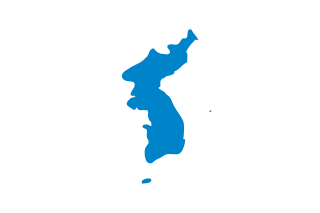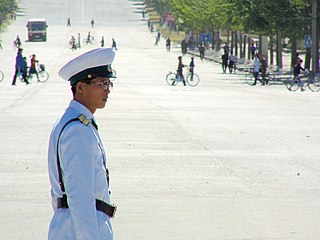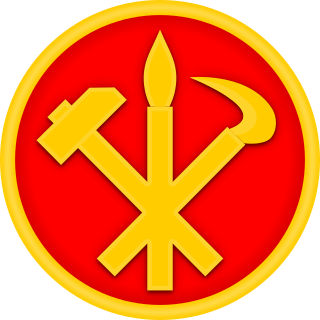
North Korea, officially the Democratic People's Republic of Korea (DPRK), is a country in East Asia. It constitutes the northern half of the Korean Peninsula and borders China and Russia to the north at the Yalu (Amnok) and Tumen rivers, and South Korea to the south at the Korean Demilitarized Zone. North Korea's border with South Korea is a disputed border as both countries claim the entirety of the Korean Peninsula. The country's western border is formed by the Yellow Sea, while its eastern border is defined by the Sea of Japan. North Korea, like its southern counterpart, claims to be the legitimate government of the entire peninsula and adjacent islands. Pyongyang is the capital and largest city.

Korean reunification is the potential unification of North Korea and South Korea into a single Korean sovereign state. The process towards reunification of the peninsula while still maintaining two opposing regimes was started by the June 15th North–South Joint Declaration in June 2000, was reaffirmed by the October 4th Declaration in October 2007 and the Panmunjom Declaration in April 2018, and the joint statement of United States President Donald Trump and North Korean leader Kim Jong Un at the Singapore Summit in June 2018. In the Panmunjom Declaration, the two countries agreed to work to officially end the Korean conflict in the future.
An estimated 84,532 South Koreans were taken to North Korea during the Korean War. In addition, South Korean statistics claim that, since the Korean Armistice Agreement in 1953, about 3,800 people have been abducted by North Korea, 489 of whom were still being held in 2006.
The human rights record of North Korea has been condemned, with the United Nations and groups such as Human Rights Watch all critical of it. Amnesty International considers North Korea to have no contemporary parallel with respect to violations of liberty.
People defect from North Korea for political, ideological, religious, economic, moral, personal, or nutritional reasons. North Koreans flee to various countries, mostly South Korea. In South Korea, they are referred to by several terms, including "northern refugees" and "new settlers".

Formerly a single nation that was annexed by Japan in 1910, the Korean Peninsula has been divided into North Korea and South Korea since the end of World War II on 2 September 1945. The two governments were founded in the two regions in 1948, leading to the consolidation of division. The two countries engaged in the Korean War from 1950 to 1953 which ended in an armistice agreement but without a peace treaty. North Korea is a one-party totalitarian state run by the Kim family. South Korea was formerly governed by a succession of military dictatorships, save for a brief one-year democratic period from 1960 to 1961, until thorough democratization in 1987, after which direct elections were held. Both nations claim the entire Korean Peninsula and outlying islands. Both nations joined the United Nations in 1991 and are recognized by most member states. Since the 1970s, both nations have held informal diplomatic dialogues in order to ease military tensions.

Kim Jong Un is a North Korean politician who has been supreme leader of North Korea since 2011 and the leader of the Workers' Party of Korea (WPK) since 2012. He is the third son of Kim Jong Il, who was North Korea's second supreme leader from 1994 until his death in 2011, and Ko Yong Hui. He is a grandson of Kim Il Sung, who was the founder and first supreme leader of North Korea from its establishment in 1948 until his death in 1994.
Capital punishment is a legal penalty in North Korea. It is used for many offences such as grand theft, murder, rape, drug smuggling, treason, espionage, political dissidence, defection, piracy, consumption of media not approved by the government and proselytizing religious beliefs that contradict practiced Juche ideology. Owing to the secrecy of the North Korean government, working knowledge of the topic depends heavily on anonymous sources, accounts of defectors and reports by Radio Free Asia, a United States government-funded news service that operates in East Asia. The country allegedly carries out public executions, which, if true, makes North Korea one of the last four countries to still perform public executions, the other three being Iran, Saudi Arabia, and Somalia, but this has been disputed by some defector accounts.

The Korean Christian Federation is a Protestant body in North Korea founded in 1946. The federation is based in the capital city Pyongyang. The current secretary general is O Kyong-u. The federation has come to play an important role in international relations involving North Korea and religious organizations in South Korea and abroad.
Chongjin concentration camp is a labour camp in North Korea for political prisoners. The official name is Kwan-li-so No. 25. Satellite images show a major expansion of the camp after 2010.
Songbun, formally chulsin-songbun, is the system of ascribed status used in North Korea. Based on the political, social, and economic background of one's direct ancestors as well as the behavior of their relatives, songbun is used to classify North Korean citizens into three primary castes—core, wavering, and hostile—in addition to approximately fifty sub-classifications, and determine whether an individual is trusted with responsibilities, is given opportunities within North Korea, or even receives adequate food. Songbun affects access to educational and employment opportunities and it particularly determines whether a person is eligible to join North Korea's ruling party, the Workers' Party of Korea.

Crime is present in various forms in North Korea, officially known as the Democratic People's Republic of Korea (DPRK).
North Korean studies is a sub-area of Korean studies. The number of researchers is comparatively small. The only fully dedicated institution to the study area is the University of North Korean Studies, Seoul, but many universities run undergraduate courses and postgraduate research programs.

Chilgol Church is a Protestant church on Kwangbok Street, Kwangbok, Chilgol, Pyongyang, North Korea. It is one of two Protestant churches in the country. It is dedicated to Kang Pan-sok, who was a Presbyterian deaconess and the mother of Kim Il Sung.

The Report of the Commission of Inquiry on Human Rights in the Democratic People's Republic of Korea is the landmark document resulting from the investigations on human rights in North Korea commissioned by the United Nations Human Rights Council in 2013 and concluded in 2014.

The Central Court is the supreme court and the highest organ in the judiciary of North Korea.

The United Front Department of the Workers' Party of Korea is a department of the Central Committee of the Workers' Party of Korea (WPK) tasked with relations with South Korea. It conducts propaganda operations and espionage and manages front organizations, including the Chongryon.
People in North Korea suffer political repression in every aspect of daily life, including speech, travel, employment, and religion. The Kim dynasty has ruled North Korea for three generations. It exercises absolute centralised power in the service of the political ideology of Juche and Songun. Juche is criticised by many scholars and is perceived as the practice of totalitarianism. Songun refers to 'military-first Policy', which means that the Korean People's Army has the highest political, economic, and resource-allocation priority, sacrificing other parts of society.

The Database Center for North Korean Human Rights is a nonprofit, non-governmental organization, headquartered in Seoul, South Korea, that conducts data collection, analysis, and monitoring of human rights violations experienced in the Democratic People’s Republic of Korea. NKDB not only offers resettlement support, psychological counseling, and educational opportunities, but also advocates for human rights advancement and transitional justice of past human rights violations in the DPRK.










